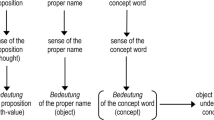Abstract
This paper focuses on the relation between logic and ontology. In particular, it demonstrates how classical logical theory can clarify the ontological part of Ludwig Wittgenstein’s Tractatus Logico-Philosophicus. To this end, the work examines the adequacy of a formal system that was devised by the Polish logician, mathematician and philosopher Roman Suszko (1919–1979) as a model for the Tractatus. Following a brief explanation of the Tractarian ontology, the main ideas of Suszko’s system and its philosophical significance will be considered. The latter will be illustrated in the context of central Tractarian concepts. Finally, two implications for a better understanding of the Tractarian ontology will be pointed out.
Similar content being viewed by others
Notes
All citations of the Tractatus are from the translation by David F. Pears and Brian F. McGuinness (Wittgenstein 1974).
Suszko (1977, p. 379) reports that in 1923 Alfred Tarski had already proved the independence of the Fregean axiom in his doctoral dissertation.
For a comprehensive bibliography of other formal reconstructions and diverse investigations pertaining to the Tractarian ontology see Jerzy Perzanowski (1990, p. 197).
Wolniewicz follows Suszko’s later practice of using the symbol ‘≡‘ for both the identity connective and predicate.
Stenius uses the terms ‘state of affairs’ and ‘atomic state of affairs’ instead of ‘situation’ and ‘state of affairs’ respectively.
Following Suszko, as a convention, universal quantifiers will usually be omitted in the formulation of theorems.
For his extensional theory of modality see Suszko (1971).
The argument was translated for me from Polish by the courtesy of Prof. Jan Woleński.
It should be noted that the parallelism between inference in the context of language and inference in the context of the world is essentially different from the parallelism between, for example, word and object.
Cf. Paul R. Halmos (1963, p. 5).
Space does not permit me to consider other Tractarian concepts that are clarified by Suszko’s formal system: logical space, logical place, the real world and possible worlds. This will be addressed elsewhere.
References
Black M (1964) A companion to Wittgenstein’s ‘Tractatus’. Cambridge University Press, Cambridge
Church A (1956) Introduction to mathematical logic, vol. 1. Princeton University Press, Princeton
Frege G (1994) On sense and reference. Rpt in: Harnish RM (ed) Basic topics in the philosophy of language. Prentice-Hall, Englewood Cliffs, New Jersey, pp 142–160
Halmos PR (1963) Lectures on Boolean Algebras. Van Nostrand, Princeton, New Jersey
Lowe EJ (1995) Ontology. In: Honderich T (ed) The oxford companion to philosophy. Oxford University Press, Oxford, pp 634–635
Omyła M (1996) A formal ontology of situations. In: Poli R, Simons P (eds) Formal ontology. Kluwer, Dordrecht, pp 173–187
Perzanowski J (1990) Towards Post-Tractatus ontology. In: Haler R, Brandl J (eds) Wittgenstein—Towards a re-evaluation. Proceedings of the 14th international Wittgenstein-Symposium: centenary celebration, Kirchberg am Wechsel, August 1989, vol. 1. Hölder-Pichler-Tempsky, Vienna, pp 185–99
Pitcher G (1964) The philosophy of Wittgenstein. Prentice-Hall, Englewood Cliffs
Poli R, Simons P (1996) Foreword. In: Poli R, Simons P (eds) Formal ontology. Kluwer, Dordrecht, pp vii-viii
Russell B (1985) The philosophy of logical atomism. Pears D (ed) Open Court, La Sale
Simons P (1981) Logical and ontological independence in the Tractatus. In: Morscher E, Stranzinger R (eds) Ethics: foundations, problems, and applications. Proceedings of the 5th international Wittgenstein symposium, Kirchberg am Wechsel, August 1980. Hölder-Pichler-Tempsky, Vienna, pp 464–467
Stenius E (1960) Wittgenstein’s Tractatus: a critical exposition of its main lines of thought. Blackwell, Oxford
Suszko R (1975) Abolition of the Fregean axiom. In: Parikh R (ed) Logic Coloquium: symposium on logic, Boston, 1972–73. Lecture notes in mathematics, vol 453. Springer, Berlin Heidelberg New York, pp 169–239
Suszko R (1971) Identity connective and modality. Studia Logica 27:7–39
Suszko R (1968a) Non-Fregean logic and theories. Analele Universitatii Bucuresti, Acta Logica 11:105–125
Suszko R (1968) Ontology in the Tractatus of L. Wittgenstein. Notre Dame J Formal Logic 9:7–33
Suszko R (1977) The Fregean axiom and Polish mathematical logic in the 1920s. Studia Logica 36:377–380
Wittgenstein L (1995) Ludwig Wittgensten: Cambridge letters. In: McGuinness B, von Wright GH (eds). Blackwell, Oxford
Wittgenstein L (1958) Philosophical investigations. Anscombe GEM (trans), 2nd edn. Blackwell, Oxford
Wittgenstein L (1974) Tractatus Logico-philosophicus. Pears DF, McGuinness B (trans), rev. edn. Routledge, London
Wittgenstein L (1980) Wittgenstein’s lectures: Cambridge, 1930–1932. Lee D (ed) University of Chicago Press, Chicago
Wolniewicz B (1968) Rzeczy i fakty. Państwowe Wydawnictwo Naukowe, Warszwa
Wolniewicz B (1984) Suszko: a reminiscence. Studia Logica 43:317–321
Author information
Authors and Affiliations
Corresponding author
Rights and permissions
About this article
Cite this article
Berber, N. The Logical Basis of the Tractarian Ontology. Axiomathes 17, 185–196 (2007). https://doi.org/10.1007/s10516-007-9015-y
Received:
Accepted:
Published:
Issue Date:
DOI: https://doi.org/10.1007/s10516-007-9015-y




